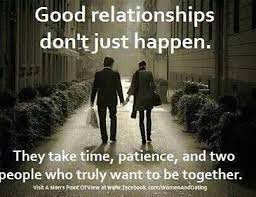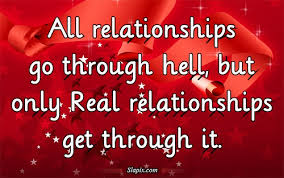Relationship Psychology
The goal is to think of relationship psychology in ways that work.
Being smart in how you use what you know about relationship psychology to foster more love and support between your
partner and yourself can make all the difference.
A useful tool in this is the concept of defense mechanisms and a commitment to consciously work to move from more primitive responses to the challenges inherent in intimate relationships to the ones described as more mature.
Defense Mechanisms Video
The video below does a good job of
laying out an orderly, effective way to conceptualize internal
coping strategies some of which you and your partner are likely to be using in relating to each other.
Sustaining good relationships is an ever changing process

At the same time, it is true that in one sense there aren't
really any secrets about getting along in relationships. We've been in
them and we have observed them all of our lives. Yet, in another sense,
in the heat of misunderstandings, disappointments, hurt feelings,
defensiveness, anger, and who knows what else, everything the we "know"
can seem to go right out the window.
There is definitely a
"not-seeing-the-forest-for-the-trees" factor in relationship psychology
that can't be completely avoided. It is the nature of the situation.
We're not just too close to the action to get the whole picture. We're immersed in the action.
Throw
in the tendency for what women want and what men want from
relationships to be different and you've got the recipe for big trouble
and a lot of disappointment.
All is not hopeless, however, just a
significant challenge for many of us. And, as seems to be common with
significant challenges, there are also significant rewards for working
through to understanding, acceptance, mastery.
Viewpoints on relationship psychology

What follows is an effort to describe observations on relationship psychology from different angles that I have found useful and that seem likely to lead to informed, focused action toward our goals.
These viewpoints are not presented as the only way to look at relationships, nor are they necessarily the best for you. They can, however, offer good places to start to start thinking, feeling, and acting differently.
Emotional Intelligence
Being better versed in different ways of looking at and describing relationships has the potential to contribute to our over all emotional intelligence.
Unlike IQ, emotional intelligence, EQ, seems to be something that we can improve if we put our minds to it. So, if you are one of us (I include myself here) who is not a natural at "getting" what is really going on with other people, there is hope. The discussion at the above link is offered as a start to studying this topic.
Conflict Management
How you view and manage conflict in your relationships is, of course rooted in your own personal psychology and how ours interacts with others with whom we are in contact. Exactly how we got the uncanny knack of falling in love with a person whose beliefs and behaviors around conflict can be so different from our own and so upsetting to us remains a matter of discussion and opinion. If it isn't an issue in your relationship, that's great. You can put attention somewhere else. If it is, however, the above link may have some helpful ideas.
Cognitive Behavioral Psychology
Another view of relationship psychology can be found in the field of Cognitive Behavioral Therapy (CBT) we get the concept that events that happen in our world do not lead directly to our feelings and actions, but rather that we place meanings on what happens and our reactions are guided by that meaning.
An example , take the notion, assumption, belief that it is necessary to have compatibility between us for our relationships to work. It seems to make a lot of sense, but on more careful analysis, it doesn't hold water. The importance of what meaning we put on particular things, like compatibility, is discussed in more detail at the link above.
Identifying what we assume about relationship psychology and learning to make our thinking/feeling processes work for us can be a huge help in making how we act in our relationships conscious. Read more about how to use this tool here.
In considering the relationship psychology, another view of how our psychological processes can affect our relationships involves the effects of unconscious efforts to cope with stresses inherent in relating closely with another person.
For example, projection , where we project our own negative thoughts and feelings onto the other person without even being aware that we have them. Seeing our own "demons" in the other person may put them out of our awareness in ourselves, but it sure can make the relationship confusing and frustrating to both people.
Or, how about depression, which has been described as looking at everything through blue-colored glasses? Put a melancholy mental-emotional filter like that on and then couple it with possible lack of energy, sleeping much more or much less than is normal for you, losing interest in sex, eating more or less than is usual for you, inability to think clearly, etc. and you have a potent recipe for relationship problems (as well a personal of course.)
Approaches From Solution Focused Therapy
Forget all the history, the reasons, the excuses. How would your relationship be if it were the way you would like it to be? If somehow tomorrow your relationship was like that, what would you be doing, saying, feeling?
This is an over-simplified description of the mindset and starting point of Solution Oriented Brief Therapy. It offers powerful tools in handling relationship problems and in seeking higher levels of intimacy as well. For a very complete and readable description of how this view of the psychology of relationships is used in troubled ones, check out Michele Weiner-Davis's book, Divorce Busting
Gender Differences
Gender differences in how we view and experience relationships are profound enough that instead of relationship psychology we perhaps should consider relationship psychologies.
What a man wants/expects from a relationship as well as what meaning he places on specific occurrences/actions/words is likely to be different from what a woman wants/expects from a relationship, as well as the meanings that she is likely to place on the same specific occurrences/actions/words.
Not every man, not every woman, but there there certainly are issues to be aware of and to see if and/or how they are affecting your relationship. This is not an insoluble problem, but one to be ignored only at our own peril.
Perhaps the best known writings on this topic are by Deborah Tannen such as "You Just Don't Understand" which looks at how men and women talk and listen, but this topic has been discussed and written about for many years. More recently Dr. John Grey, author of "Mars and Venus", and Dr. Richard Schwartz, creator of "Internal Family Systems Therapy", Terrence Real, and others have added useful observations on this topic as well as relationships in general.
On the other hand, it is only fair to note that if gender differences were the cause of relationship problems, then same sex couples would never have problems or break up.
Our mind-body states as we engage in relationships are, of course, the instruments upon which the music of the relationship are played. Our ability to work with our mind-body systems as we interact with others in open and accepting ways is basic to achieving the highest results. In his late years Ram Dass wrote about his experience of this in the context of aging in Still Here In which he described how he saw mindfulness meditation fitting into a practice for achieving this.
That there are predictable stages in relationships is a notion that can be particularly helpful in keeping one's perspective.
While there are various versions of this concept presented in different places, how the general idea that when separate beings interact with each other the interface results in a series of steps in how they come to understanding and working together can often keep us from getting needlessly lost is discussed here.
When considering relationship psychology, issues surrounding how we deal with power in relationships are always present, whether we are conscious of them or not and no matter how a particular model chooses to describe them.
Some people have described efforts to exert power in relationships manipulatively as emotional blackmail.
And, of course, we are perhaps most aware of it when it becomes destructive and is expressed in the various forms of abuse. Abuse does not go away with age. Take it seriously!
There is are discussions of power and abuse along with a worksheet for methodically assessing the allocation of power in your relationship HERE. and at the link above.
Return from Relationship Psychology to Home Page
Copyright @ 2008 - 2018 Better-Relationships-Over-50.com